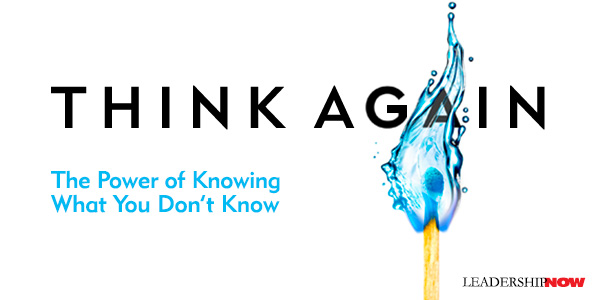 |
 |
02.26.21

Think Again: The Power of Knowing What You Don't Know
RETHINKING can cause uncertainty. Make us uncomfortable. Feel uneasy. It can threaten our identities. But rethinking can also help us find solutions to old problems, deepen our perspective, release us from inherited dogma and other people’s opinions, and understand how our closely held values relate and are applied to our changing environment. Adam Grant challenges us to Think Again—to question what we think we know. “Unfortunately, when it comes to our own knowledge and opinions, we often favor feeling right over being right.” Grant’s colleague Phil Tetlock discovered that when we think and talk (and scan social media), we tend to slip into the mindsets of three different professions: preachers, prosecutors, and politicians. “The risk is that we become so wrapped up in preaching that we’re right, prosecuting others who are wrong, and politicking for support that we don’t bother to rethink our own views.” (Grant offers a short Think Again quiz on his website.) The approach to ideas and opinions that we need to be gravitating to is the scientist mindset. It is a mindset of curiosity and a search for truth rather than becoming defensive, offensive, or appeasing.
Rethinking is not a question of how smart you are. “The brighter you are, the harder it can be to see your own limitations. Being good at thinking can make us worse at rethinking.” What does matter is how curious and actively open-minded you are. Actively in the sense that we are searching for reasons why we might be wrong. A key to rethinking is being able to detach yourself from your beliefs. This takes two forms: “detaching your present from your past and detaching your opinions from your identity.” Who you are should be a question of what you value, not what you believe. Values are your core principles in life—they might be excellence and generosity, freedom and fairness, or security and integrity. Basing your identity on these kinds of principles enables you to remain open-minded about the best ways to advance them. It is quite common for differences of opinion to turn into a relational conflict—personal and emotional—filled with animosity and vindictiveness. Task conflict is often desirable in order to get to the best answer. “The absence of conflict is not harmony, it’s apathy.” When a clash gets personal and emotional, we become self-righteous preachers of our own views, spiteful prosecutors of the other side, or single-minded politicians who dismiss opinions that don’t come from our side. While it’s nice to have people around us that agree with us, successful people need a challenge network—people we trust that can point out blind spots, doubt our knowledge and be humble about our expertise. In short, people who will question us and hold us accountable for rethinking our perspectives. Wilbur Wright once wrote, “Honest argument is merely a process of mutually picking the beams and motes out of each other’s eyes so both can see clearly.” Grant notes that “research suggests that we want people with dissimilar traits and backgrounds but similar principles. Diversity of personality and experience brings fresh ideas for rethinking and complementary skills for new ways of doing.” In a debate, it is best to begin with finding common ground. It’s a dance. “When we concede that someone else has made a good point, we signal that we’re not preachers, prosecutors, or politicians trying to advance an agenda. We’re scientists trying to get to the truth.” At the same time, keep your argument simple. Too many, and you will dilute the power of each and every one. “We don’t have to convince them that we’re right—we just need to open their minds to the possibility that they might be wrong.” When we know that we might not really know, rather than investigating, “we become mental contortionists, twisting and turning until we find an angle of vision that keeps our current views intact.” And we can become quite hostile. No surprise there. It’s hard to get others to change. It’s better to help them find their own reason to change. And the best way to do that is to listen—ask questions. What we have to avoid is the righting reflex—“the desire to fix problems and offer answers.” There are a good number of issues in the world where there is more going on than we know. The issues are complex and not binary—yes or no. Admitting the complexity of an issue is often a sign of credibility. And skeptics are not deniers. They are curious. If you find yourself saying _____ is always good or _____ is never bad, you may be a member of an idea [or personality] cult. Appreciating complexity reminds us that no behavior is always effective and that all cures have unintended consequences. Grant gives us many more reasons to rethink what we think than I have covered here. His concern is that by reading the book, we don’t close the book on the issue of rethinking. The book brings awareness to our human nature, but it doesn’t make us do anything about it. It’s easy to look at our loosely held beliefs and rethink them. The challenge is to rethink those deeply held ideas and beliefs that tend to divide us—especially those ideas that we have blindly accepted from others. We—collectively—have outsourced far too much of our thinking. It’s time to think again. 
Posted by Michael McKinney at 07:51 AM
|
BUILD YOUR KNOWLEDGE
 

How to Do Your Start-Up Right STRAIGHT TALK FOR START-UPS 
Grow Your Leadership Skills NEW AND UPCOMING LEADERSHIP BOOKS 
Leadership Minute BITE-SIZE CONCEPTS YOU CAN CHEW ON 
Classic Leadership Books BOOKS TO READ BEFORE YOU LEAD |